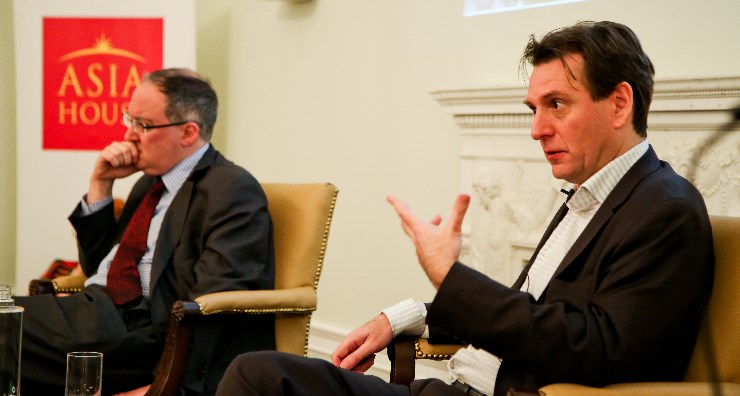Driving commercial and political engagement between Asia, the Middle East and Europe
Driving commercial and political engagement between Asia, the Middle East and Europe
Driving commercial and political engagement between Asia, the Middle East and Europe

Financial Times Asia Editor David Pilling was the chief guest at an exclusive breakfast briefing held on 14 January for Asia House’s corporate members.
In the evening, Pilling gave a talk about his first book, Bending Adversity: Japan and the Art of Survival, in conversation with Gideon Rachman, chief foreign affairs commentator for the Financial Times.
The private briefing, held under the Chatham House Rule, focused on Japan and Abenomics, the progress of China’s Third Plenum Reforms, island disputes between China and Japan, and the upcoming elections in India and Indonesia.
The event was attended by representatives from Asia House’s corporate members, including ANZ, AstraZeneca, Barclays, BP, Diageo, Eversheds, EY, G3, GSK, Herbert Smith Freehills, McKinsey & Company, Standard Chartered and Telstra Global .
The evening event was open to the general public and Asia House Friends.
At that event, Pilling said that the book name, Bending Adversity, was inspired by the 2011 earthquake and tsunami when a Japanese person said to him: “Wazawai tenjite fuku to nasu” (“Make the best of a bad lot”) and that struck him as pertinent to Japan, a country primed for earthquakes and tsunamis with a perpetual sense of impermanence that is continually being rebuilt and able to change quite dramatically without losing its core essence.
He also spoke about the Senkaku/Diaoyu Islands dispute saying China was not motivated by oil or fish.
“I think this is about the history of China’s sense of humiliation by the West specifically at the hands of Japan. These islands have strategic value. If China continues to grow as it has been, it will want to expand around the coast,” he added.
He then pointed out how concerning it was that China, Japan and South Korea were not talking to each other.
“Can you conceive of that in Europe?” he asked, adding Japan refused to admit there was any dispute.
“Until fairly recently most of Asia was happy about the rise of China because China is an economic dynamite in Asia. Till now her rise was presented as peaceful development but now that is beginning to shift and now China is staking claim to the South China Sea and there is a nervousness in the region.”
Moving on to Japan’s fragile economy, he said: “Abenomics is a statement that deflation can be defeated.” He added: “But it does not produce more babies. You cannot print babies. It puts Japan in a better light but it’s not a panacea.”
Forty per cent of the Japanese population could be over 65 by 2050 which raises questions about the dependency ratio, he said.
“But I tend to think some of these fears are overdone as Pakistan has fantastic demographics but it has not done so well. However, I disagree the Japanese so-called ‘race’ will be extinct by 3000.”
naomi.canton@asiahouse.co.uk
Asia House will host its next Public Policy Briefing for corporate members with HE Mr Ranjan Mathai, Indian High Commissioner to the UK. For more information click here.
The Public Policy series, which consists of private briefings with high-level political figures, is open exclusively to Asia House’s corporate members.
Click here for more information about corporate membership.
Listen to David Pilling speak about his new book Bending Adversity: Japan and the Art of Survival below.
